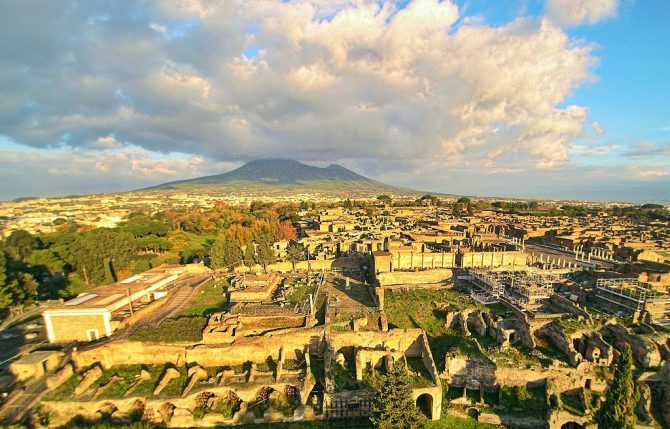On August 24, 79 A.D. (although there has been some recent questioning around the exact date), the Roman Empire was shaken by a natural disaster quite unlike anything seen before. Mount Vesuvius, long dormant and situated along the idyllic Bay of Naples in Italy, erupted in such a catastrophic manner that those who witnessed it believed they were observing the end of the world.
The ensuing brutality of the volcanic blast - an onslaught of raining pumice and debris, toxic gases and a final, lethal 'pyroclastic' surge - utterly destroyed nearby towns and many of their inhabitants, those who were not lucky or shrewd enough to escape before it was too late. Herculaneum and Pompeii, Oplontis, Stabiae and lapilli - names which have not been forgotten, even after all these years.
Though Vesuvius has had several smaller eruptions since, they have all rather paled in comparison to the 79 A.D. disaster. Yet despite the destruction caused it is remarkable to note how much has been preserved, and as a result, how much we have come to know about the events of that day, even many centuries later. Due to the nature of the eruption, buildings, people, household items and even food have been uncovered, eerily encased by the volcanic ash. Over the course of many years, Archaeologists have been able to recover many of these artifacts. This has afforded us a unique and unprecedented insight into various aspects public and private life in ancient times, in a way that we might otherwise have never had. The story of Vesuvius has always enraptured me, perhaps for this reason.
Almost as remarkably, the events which unfolded on that fateful day were captured and immortalised in writing by Pliny the Younger, a Roman author and administrator, who observed as the chaos unfolded from across the Bay of Naples where he was staying at his Uncle Pliny the Elder's villa. Incidentally his Uncle died that day as a result of inhaling noxious fumes from the eruption. Pliny the Younger recounted his testimony in two separate letters to Cornelius Tacitus, a great Roman historian.
Christchurch City Libraries has Pliny's Letters compiled by Alfred Church and W.J. Brodribb. You will also find transcripts of both letters online.
"You could hear the shrieks of women, the wailing of infants, and the shouting of men; some were calling their parents, others their children or their wives, trying to recognize them by their voices. People bewailed their own fate or that of their relatives, and there were some who prayed for death in their terror of dying. Many besought the aid of the gods, but still more imagined there were no gods left, and that the universe was plunged into eternal darkness for evermore." - Pliny the Younger, excerpt from letter to Cornelius Tacitus.
Further Information
If you're interested in learning more about this fascinating day from the world's history, or about life and death as it occurred back then, check out the following Christchurch City Libraries' eResources:
- Britannica Library Adults: an online and interactive version of Encyclopædia Britannica
- Gale in Context: Science: Contextual information on hundreds of today's most significant science topics
Here are some books on the topic that I'd recommend, if you'd like to explore in greater depth.
Life and Death in Pompeii and Herculaneum, illustriously illustrated with photographs of landscapes, ruins and artifacts from the two cities. This book is beautiful and serves as a useful guide and reference point.
Pompeii, a book less about the eruption of Vesuvius, and more an intriguing and enjoyable glimpse into everyday life in the lost city of Pompeii. By Professor of Classics at Cambridge, Mary Beard.
Buried by Vesuvius, which provides a comprehensive look into the spectacular story of Villa dei Papiri at Herculaneum, which was buried by the eruption of Mount Vesuvius and excavated in the 18th Century.
'The Shadows of Mt Vesuvius' is an interesting read; author Daisy Dunn breathes life into Pliny the younger's letters in a fictional recount.
And I must not forget, Secrets of Vesuvius, which is available through our website on Access Video on Demand. This is an historical TV drama based on the delightful Flavia Gemina 'Roman Mysteries' series by Caroline Lawrence - suitable for teens and older kids.
This and much more in our catalogue! Happy exploring.




Add a comment to: 79 A.D.: When the sky went dark